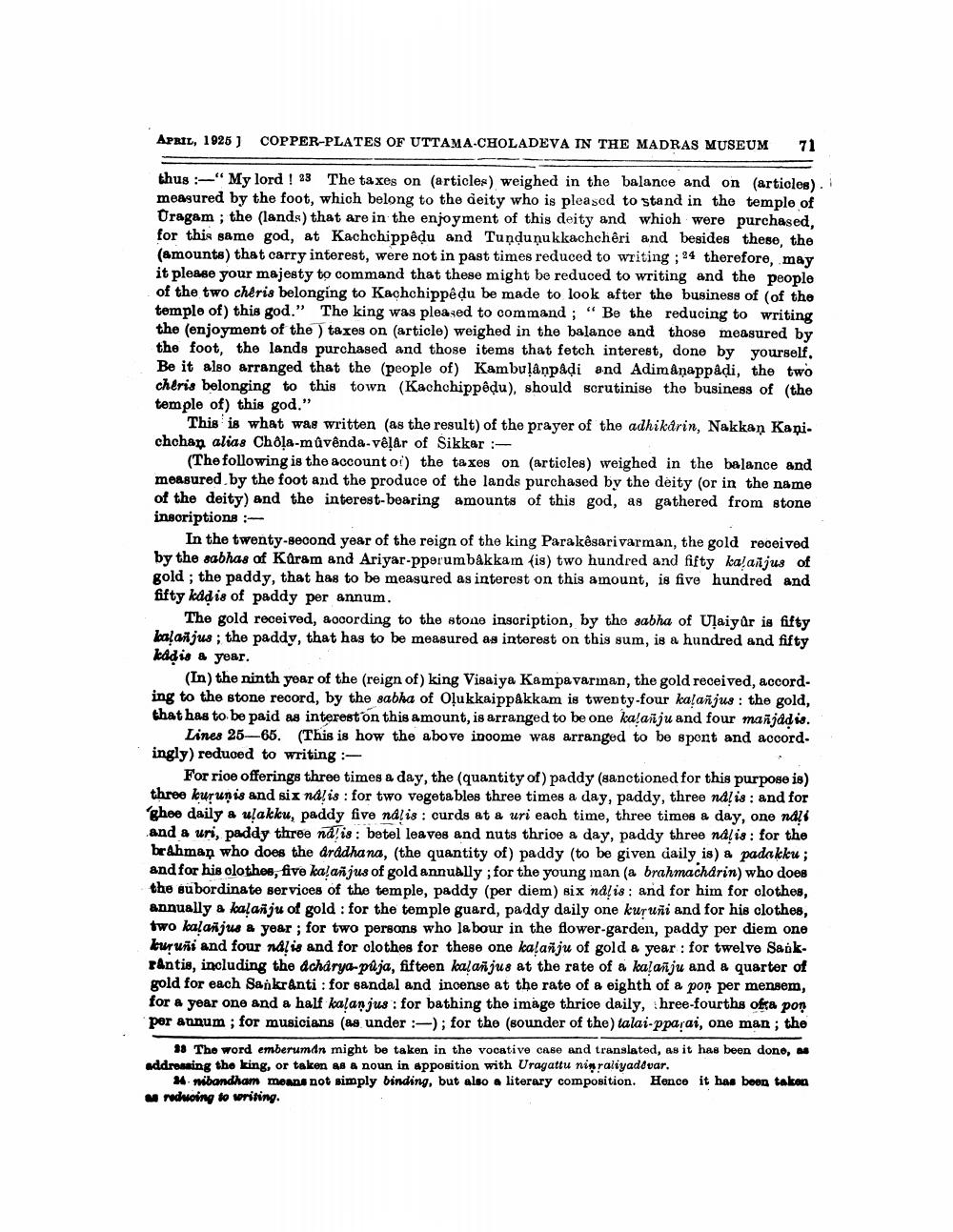________________
APRIL, 1925) COPPER-PLATES OF UTTAMA-CHOL ADEVA IN THE MADRAS MUSEUM
71
thus :-"My lord ! 23 The taxes on (articles) weighed in the balance and on (articles). measured by the foot, which belong to the deity who is pleased to stand in the temple of Uragam ; the (lands) that are in the enjoyment of this deity and which were purchased, for this same god, at Kachchippêdu and Tundunukkachchêri and besides these, the (amounts) that carry interest, were not in past times reduced to writing : 24 therefore, may it please your majesty to command that these might be reduced to writing and the people of the two chéris belonging to Kachchippedu be made to look after the business of (of the temple of) this god." The king was pleased to command; “Be the reducing to writing the (enjoyment of the ) taxes on (article) weighed in the balance and those measured by the foot, the lands purchased and those items that fetch interest, done by yourself, Be it also arranged that the people of) Kambulânpadi and Adimanappadi, the two cheris belonging to this town (Kachchippêdu), should scrutinise the business of (the temple of) this god."
This is what was written as the result) of the prayer of the adhikarin, Nakkan Kani. chchan alias Chļa-mûvênda-vêļar of Sikkar :
(The following is the account of the taxes on (articles) weighed in the balance and measured by the foot and the produce of the lands purchased by the deity (or in the name of the deity) and the interest-bearing amounts of this god, as gathered from stone inscriptions
In the twenty-second year of the reign of the king Parakêsarivarman, the gold received by the sabhas of Karam and Ariyar-pperumbakkam (is) two hundred and fifty ka! asjus of gold; the paddy, that has to be measured as interest on this amount, is five hundred and fifty kad is of paddy per annum.
The gold received, according to the stone inscription, by tho sabha of Ulaiyur is fifty lalalt jus; the paddy, that has to be measured as interest on this sum, is a hundred and fifty kadis a year.
(In) the ninth year of the reign of) king Visaiya Kampavarman, the gold received, according to the stone record, by the sabha of Olukkaippakkam is twenty-four kalanjus: the gold, that has to be paid as interest on this amount, is arranged to be one kalaju and four mañjadis.
Lines 25-65. (This is how the above inoome was arranged to be spent and accord. ingly) reduced to writing -
For rice offerings three times a day, the (quantity of) paddy (sanctioned for this purpose is) three hour unis and six ndlis : for two vegetables three times a day, paddy, three ndl is: and for ghoe daily a ulakku, paddy five ndlis: curds at a uri each time, three times a day, one nd? and a uri, paddy three ndlis: betel leaves and nuts thrice a day, paddy three ndlis: for the brahman who does the aradhana, (the quantity of) paddy (to be given daily is) & padakku; and for his olothes, five ka, anjus of gold annually; for the young man (a brahmacharin) who does the subordinate services of the temple, paddy (per diem) six ndļis : and for him for clothes, annually a kalanju of gold : for the temple guard, paddy daily one kuruñi and for his clothes, two kalarju & year; for two persons who la bour in the flower-garden, paddy per diem one kuruni and four ndlis and for olothes for these one kalanju of gold a year : for twelve Sankrantis, including the acharya-puja, fifteen kalanjus at the rate of a kalasju and a quarter of gold for each Sankranti : for eandal and incense at the rate of a eighth of a pon per mensem, for a year one and a half kalan jus : for bathing the image thrice daily, hree-fourths ofta pon per annum ; for musicians (89 under :-); for the (sounder of the) talai-pparai, one man; the
13 The word emberumdn might be taken in the vocative case and translated, as it has been dono, as addressing the king, or taken as a noun in apposition with Uragattu nigraliyad&var.
24 mibandham means not simply binding, but also a literary composition. Hence it has been taken reducing to writing.




